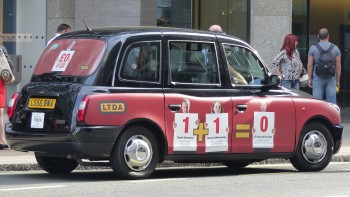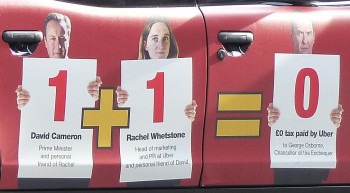We are developing the social individualist meta-context for the future. From the very serious to the extremely frivolous... lets see what is on the mind of the Samizdata people.
Samizdata, derived from Samizdat /n. - a system of clandestine publication of banned literature in the USSR [Russ.,= self-publishing house]
|
These four separate craters were man made, or to be honest, created by a bunch of government union drones, not refilled with blacktop or marked with an orange cone. The question is whether this is utter incompetence, blatant indifference, spite or a business transaction between government drones and local tire dealers. Luckily, government traffic engineers have been too swamped to properly time the lights on Chestnut Street for the last 20 years, so no one can travel faster than 15 mph anyway. Government lessens the pain of their ineptitude through their ineptitude in another area.
– Jim Quinn
Linked to by the amazingly industrious and non-drone-like Instapundit, in this case in the person of non-drone Ed Driscoll.
I hate taxis. Hate them. Hate them. Hate them. Hate them. Loathe them. Detest them.
This is a fairly common feeling amongst frequent travellers. You arrive in a foreign and unfamiliar place on a plane or train. You are tired. You are not familiar with local prices. You are not familiar with local customs. You probably know the name of the hotel or other place that you want to go to, but you possibly don’t know where it is or what is the best route to take you there.
So you get into a taxi. It is just you and the driver. You want him (or her, but it never is) to take you to your destination. You are putting yourself in a sealed and locked car with someone you have never met before and, and who you will never do business with again. He doesn’t know who you are and never will, and you don’t know who he is, and never will. In the event that you have grounds for a complaint, it might be possible to identify him through his medallion number or licence number or something, but you are not going to think to do that (being very tired) and even if you do, complaining later will involve procedures, languages, laws and customs that you are not familiar with. A driver who takes advantage of you is extremely unlikely to suffer any consequences whatsoever.
As a consequence of all this, there are an absolutely endless number of ways in which taxis drivers will take advantage of foreign travellers – particularly ones who have just arrived at airports and railway stations. These vary from mild dishonesty to outright criminality. All of the following have happened to me, at one time or another. Vaguely from least bad to worst bad.
- The taxi driver takes a long route, so increasing the fare
- The taxi driver flatly refuses to take you where you ask to be taken, but decides to take you to a different destination entirely, because he is being paid a commission by a different hotel/bus company/museum/airport/warlord/country than the one whose services you want to use. (Insisting that he does not understand you for linguistic reasons when he clearly does often happens in this and many other scams)
- Taxi driver refuses to understand expressions like “What will it cost me to go to x?” or “Turn on the meter” in English (or indeed any other language) and is completely unable to understand gestures like pointing to your wallet, or pointing to the meter, or any such thing. At least, not until the end of the journey, at which point he will insist on a fare four times what is reasonable.
- The taxi driver agrees on a fare, but at the end of the journey insists that he did not agree on that fare, and asks for a different amount of money. The fact that “fifteen” sounds very similar to “fifty” in English, and similar, can be particularly effective here.
- Having agreed on a fare, the taxi driver drives you to a point in the middle of nowhere – but worryingly close to the Syrian border – and insists that you give him more money than was previously agreed upon, and refuses to go anywhere further and tries very hard to prevent you from finding another taxi driver until you agree
- The meter is rigged. When a passenger who does not know better – a foreigner or someone otherwise from out of town – gets into the taxi, the driver pushes a button on the meter which causes it to charge three times as much as it does regularly
- At the end of the journey, you only have a banknote that is many times the fare, and the driver insists that he has no change.
- At the end of the journey, you pay your fare, and the taxi driver gives you forged money as change
- At the end of the journey, the fare is 90 pesos. You give the driver a 100 peso note. He shows you the note you gave him back at you – a 10 peso note, indicating that you gave him the wrong amount. You give him another 100 peso note, failing to realise that he switched the notes and you have just paid him 90 pesos too much. (You are particularly vulnerable to this when it is dark, you have just got off a long flight, and the local money is unfamiliar. Actually, this is true of most of the above, but I was particularly annoyed with myself when I fell for this one that time in Buenos Aires. For the record, the forged money was also in Buenos Aires).
These scams all have to do with one of three things: the choice of the route, the setting of the fare, and the exchange of money. When I use Uber, all three of these issues are solved, utterly. Firstly, Uber’s satnav/GPS system tells the driver what route to take, and I as a passenger am shown the route on a map. If the driver diverts too far from that route without a good reason, I make a simple complaint, my money is refunded to me, the driver suffers reputational damage, and he does not get paid. The fare is decided by a third party (whose terms and conditions the driver has agreed to) and quoted to me in advance, either as a flat amount or a fare per mile. The “meter” is controlled by that third party, and cannot be rigged. And I pay the money to a third party, and the money is essentially held in escrow until I have completed my journey and have said I am happy with it. The driver knows he gets paid if he does his job properly, and I know that there will be no attempt to scam me over money. Because I know he is not going to scam me and he knows I am not going to scam him (and anyway, because there is recourse if one of us does) there is no reason for us to not trust one another, and we are therefore invariably polite and friendly to each other. Which makes my day nicer, and very likely his also.
I am extremely reluctant to get in a taxi in a foreign city, full stop. However, I will use Uber any time.
Aka Stealth Bomber Yacht?:

I came across this very superior yacht because it was written up and pictured up in the Daily Mail, among many other www places.
It is the work of this guy:
Long distances are achievable with reduced out-of-water drag and stormy ocean conditions would incur virtually no slamming. Improved efficiency is driven by elevated hydrofoil propulsion and would be an inherent performance benefit of this type of design.
Long distance, smooth travel through rough water at high speed: the key performance attributes of this new motor yacht design.
Yes, sadly this is only, as yet, a yacht “design”. This is a “concept yacht”.
Notions like this are why the world needs rich people. Their job is to check whether stuff like this actually works, at their own risk and at their own expense. The rest of us can then pile in and share the fun.
This thing should star in the next Bond movie, “smooth travel through rough water at high speed” being the very definition of James Bond’s world.
The Guardian is not where I would expect to find a rave review of Top Gear.
Top Gear fetishises the totally unnecessary consumption of fossil fuels in the name of sport, entertainment and feeling better about your premature ejaculation disorder; it normalises dangerously fast driving; it contributes to the hunger for more and more cars that we neither need nor can sustain; it treats the sheer act of moving a machine as if it’s a display of heroic bravery and skill; and it paid Jeremy Clarkson’s salary for over 25 years.
Sounds great! Of course, with Clarkson and co. off to Amazon Prime, everyone is a bit worried whether the new line-up will be any good.
…the problem with Top Gear isn’t simply the lack of diversity of its presenting line-up, or its wrinkle-kneed wardrobe. It’s not its heritage brand of lazy bigotry and short-term greed, its predilection for petrol-powered laziness dressed up as machismo, its weaker-than-Liptons long-running in-jokes, its “I Am the Stig” USB memory sticks or its endless, jaw-slackening rota of reruns. It’s all of it. It’s the cars, motor industry and mentality on which it’s built. It’s the whole petrol-guzzling, self-interested, short-term, pleasure-seeking, morally indifferent, climate-changing, nature-breaking package. And it’ll take more than a new line-up to change that.
Well that’s a relief, then.
…for the striking London black cab drivers whose hard won skills have been rendered obsolete by Uber and Addison Lee, just as we should remember with pity the thousands of drivers of hansom cabs whose hard-won skills with horses were rendered obsolete by the coming of the internal combustion engine. I am not being flippant or sarcastic. To lose one’s accustomed livelihood to new technology is a tough spot to be in, and there will be many reading this, some of them highly paid at present, who should look at Trevor Merralls’ situation and tremble.
But that pity should not extend to offering to keep Mr Merralls forever in the style to which he has become accustomed simply because he was born working class, or to stifling the opportunity for self-employment that Uber offers to its drivers (also working class), or to depriving Londoners who could not afford black cabs of the ability to take a cab at a reasonable price at any time day or night, and which will, as one of the Guardian commenters put it, “actually go to exotic destinations like Lewisham”.

– More about Wicked Campers and their vans (copiously illustrated and with further links) at BrianMicklethwaitDotCom. Click on the middle picture at the bottom of that posting to see where I found the above sign.
I had some incoming from Uber yesterday. The TFL consultation on their proposals to bugger-up-all-competition-to-the-cossetted-black-cab-mafia is underway. I am usually rather sceptical about these things but Uber is such an obviously Good Thing that I participated anyway. You never know, it might make a difference.
Autonews reports that programmers working on driverless cars have found that having made them perfectly law-abiding, unable to commit traffic infractions, the result is that they have double the accident rate of driven cars, as they cannot cope with the anarchic driving of humans.
They obey the law all the time, as in, without exception. This may sound like the right way to program a robot to drive a car, but good luck trying to merge onto a chaotic, jam-packed highway with traffic flying along well above the speed limit. It tends not to work out well.
As the accidents have piled up — all minor scrape-ups for now — the arguments among programmers at places like Google Inc. and Carnegie Mellon University are heating up: Should they teach the cars how to commit infractions from time to time to stay out of trouble?
“It’s a constant debate inside our group,” said Raj Rajkumar, co-director of the General Motors-Carnegie Mellon Autonomous Driving Collaborative Research Lab in Pittsburgh. “And we have basically decided to stick to the speed limit. But when you go out and drive the speed limit on the highway, pretty much everybody on the road is just zipping past you. And I would be one of those people.”
Undaunted by collisions with reality, the diagnosis is that the problem is human driving.
Driverless vehicles have never been at fault, the study found: They’re usually hit from behind in slow-speed crashes by inattentive or aggressive humans unaccustomed to machine motorists that always follow the rules and proceed with caution.
Or might it be, as a libertarian might say, that government rules setting arbitrary speed limits create conditions where collisions are more likely?
I and my libertarian friends all love Uber. By that I don’t just mean that we love using Uber, the service, although I am sure that just like many others, we do. I mean that we love talking about Uber, as a libertarian issue, as an issue that nicely illustrates what libertarianism is all about and the sorts of things that libertarians believe in. In particular, we believe in: technological innovation and the freedom to do it, for the benefit of all, except those in the immediate vicinity of it and overtaken by it, because they make a living from the technology that is being overtaken.
Example. A couple of weeks ago I attended a talk about Art, which suggested that Art is not abundant enough and not benefiting enough people. A big part of the response from the floor during the Q&A afterwards was: It depends what you mean by Art. By most reasonable definitions, there has never been more Art. Prominent London libertarian Professor Tim Evans compared the attitude of the speaker to that of a London Black Cab driver fretting about how to keep London Black Cabs going, what with so many Londoners now preferring Uber Cabs. My point is not that this was a fair comparison, although I thought it was. My point is that we libertarians love Uber so much that we insert Uber into conversations about quite other things. Uber is something that we just love to talk about. And it’s not just Tim Evans, and me, and Johnathan Pearce, and Rob Fisher and Perry de Havilland who love to write and talk about Uber. Based on the conversations I’ve been having with fellow libertarians, it’s pretty much all of us. This is an issue which unites all of us, and which divides our opponents. After all, even anti-libertarians need a taxi ride from time to time, and they prefer it to be cheap and obtainable rather than expensive and unpurchasable.
At the very moment I first typed in the above paragraph, an email arrived from the IEA, telling me about how the IEA’s boss, Mark Littlewood, has been mixing it with Black Cabbies on the radio.
As for me, I found my interest renewed in the Uber battle when I encountered this Black Cab, last August, in Victoria Street, just up the road from the Houses of Parliament:

Why was this cab of interest to me? Well, let’s take a close look at the rather intriguing politics lesson on the side of this Black Cab:

As you can see from this posting at my personal blog, way back in August when I took those photos, I had in mind to put something here way back, provoked by them. But the delay didn’t matter. This issue is not going away any time soon.
The taxi driver whose taxi sported this advert clearly thought that this was an advert about how wicked Uber is. Uber lobbies. Uber puts Prime Ministerial friends on its payroll. Bad Uber. But to me, this read more like an advert in favour of David Cameron. Cameron wants Uber to flourish in London. Does he now? I did not know this. Good for Cameron. And bad for Boris Johnson, Mayor of London, who does not.
This is also an advert for Uber itself. Uber is cheaper … because it pays no tax! Come again … Uber is cheaper, you say? Hm, interesting. I must give it a go.
The LTDA, who, as you can see from the top picture, is responsible for the above advert, thinks that Uber is systematically breaking the law. What that tells me is not that Uber is bad, but that the law, insofar as it now impinges upon Uber, is an ass.
→ Continue reading: Why we libertarians love Uber not just as a service but as an issue
These bureaucratic new rules will not improve your ride. They’re designed to address the concerns of black cab drivers, who feel under pressure from increased competition. But the answer is to reduce the onerous regulations cabbies face today – not increase them for everyone else
– Uber spokesman
By now, everyone knows about the Volkswagen scandal. VW have admitted installing software that cuts exhaust emissions when their cars are being tested and lets them spew death and disease every which way when they’re not.
So who is the villain here? To my mind there are two possible suspects: the US Environmental Protection Agency and the European Union. I know what you are thinking: why can’t we pin the blame on both of them? Well, cheer up because I think we can.
To my mind pollution is simple. The polluter pays the victim. I would like to find some non-state means for doing this and as I understand it in the days prior to environmentalism just such a mechanism – albeit involving courts – did indeed exist.
Of course, since then government has queered the pitch for everyone introducing two principles which it rolls out according to taste. One, that the polluter pays the government. Two, that the polluter becomes subject to government violence – or to put it in statist terms: pollution is regulated.
So, the government imposes regulations in which if you score below a certain number you are left alone and if you score above they send the boys round. Black mark against the EPA.
But meanwhile the EU has been promoting diesels like crazy over recent years. Whether this is a sinister French plot or the result of the global warming hoax, who knows. The really sad thing is that we have ended up with that abomination: the diesel-powered sports car. Oh yeah, and London’s air ain’t too great either.
 Some diesel Miscellaneous thoughts and questions
Why is that we are quite happy to use the term NOx but not the term COx? It makes no sense.
What were VW doing selling diesel cars in the US? Petrol (US = gasoline) is much cheaper there. So the market for diesel cars is much smaller. Come to think of it it’s probably because they were trying to make inroads into the market in the expectation that diesel taxes would come down making diesels more attractive. It is a tax issue isn’t it?
Why is it that cars are regulated in this way? I find it difficult to believe that a lorry or bus is in any way cleaner than a car. But I bet the latter two are not nearly as stringently regulated. To ask the question is, of course, to answer it. They do it because they can.
Did anyone else catch that excellent Mark Evans documentary about the diesel engine on BBC4 the other night? Comet swirl chambers, eh?
Boris Johnson wants people to pay more for transport in London because breaking up a taxi cartel is bad apparently. And people paying less to move around the city is bad for the economy apparently. And in an age of ubiquitous GPS, ‘The Knowledge‘ should be used to limit the numbers of people driving cabs in order to keep prices up.
Bear in mind this fuckwit may well try to be Prime Minister one day.
|
Who Are We? The Samizdata people are a bunch of sinister and heavily armed globalist illuminati who seek to infect the entire world with the values of personal liberty and several property. Amongst our many crimes is a sense of humour and the intermittent use of British spelling.
We are also a varied group made up of social individualists, classical liberals, whigs, libertarians, extropians, futurists, ‘Porcupines’, Karl Popper fetishists, recovering neo-conservatives, crazed Ayn Rand worshipers, over-caffeinated Virginia Postrel devotees, witty Frédéric Bastiat wannabes, cypherpunks, minarchists, kritarchists and wild-eyed anarcho-capitalists from Britain, North America, Australia and Europe.
|








